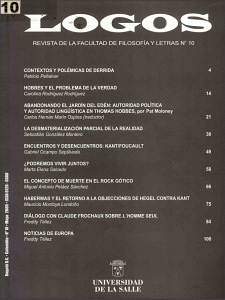Abstract
This article shows and describes the most important discussions around the philosophy of Derrida. His philosophy could be characterized as broad and complex as far as concerned to the diversity of the issues he treated, the rigorous of his approximation to them and his particular stile. For all this the philosophical contexts that surround his ideas and the polemics derived from them are analyzed. The validity of framing the thinking of Derrida in what is today called “postmodernism” or “post structuralism” is discussed, along with the equivocal readings, posterior corrected, of Derrida from Habermas. Is also discussed the disastrous interpretation of Derrida of the English analytic philosophy, represented by Searle; also are treated his deep confrontation with Foucault around the impact of cartesianism in modernity; his clash with Lacan on the new trends of psychoanalysis, rejected by Lacan and supported by Derrida; his elliptic relations with the distinct Marxist motives and the critic of Derrida to Heidegger about the metaphysic debris of the latter, especially around the modernity’s metaphysic dogma of the ontologic separation of the animal and the spiritual in the subject. Finally his contributions are evaluated, as a “rarity”, and because of that, “monstrous”. Monstrous because Derrida turns all that is classic in “aporethic”, disestablishing the tranquil world of philosophy and its essential distinctions, being “deconstruction” the main responsible of it.Downloads
Download data is not yet available.



